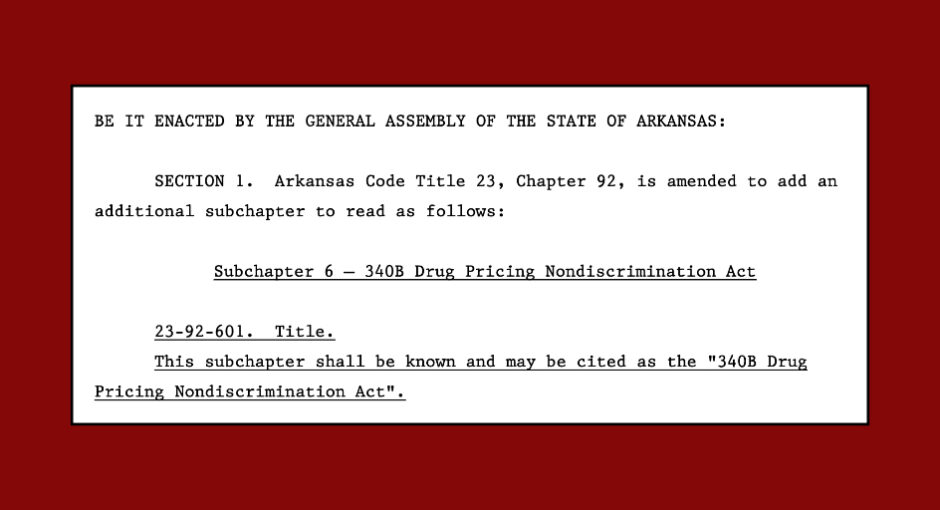The state of Arkansas and Arkansas 340B covered entities separately asked a federal appeals court yesterday to back a judge’s decision in December that the state’s novel 340B anti-discrimination law is not preempted by the 340B statute nor by the U.S. Food and Drug Administration’s Risk Evaluation and Mitigation Strategies requirements.
Yesterday was the deadline for Arkansas and intervenors in the case to respond to Pharmaceutical Research and Manufacturers of America’s brief in February urging the U.S. Eighth Circuit Court of Appeals in St. Louis to overturn the decision.
Arkansas enacted legislation in May 2021, Act 1103, that says manufacturers (1) may not prohibit pharmacies from contracting with 340B covered entities by denying access to the drugs they make and (2) may not deny 340B pricing “for an Arkansas-based community pharmacy” that receives 340B-purchased drugs under a 340B contract pharmacy arrangement. The state insurance department published implementing regulations in September 2022.
In a win for the state and 340B providers, a federal district judge ruled in December that Act 1103 is not preempted by the 340B statute nor the Food, Drug, and Cosmetic Act (FDCA).
PhRMA’s Arguments
PhRMA told the court in February that Act 1103 intrudes on the 340B statute and frustrates Congress’ intent to limit 340B and its burdens on drug manufacturers. It said the law tries “to dictate as a matter of state law how the federal 340B program should operate, despite having no authority to impose conditions on participation in a uniquely federal program.”
“Regardless of Act 1103’s ostensible purpose, Arkansas cannot enforce a state law that intrudes on and reshapes a comprehensive federal statute or directly conflicts with federal mandates,” PhRMA said.
State’s Response
The state in its brief yesterday said the district court “correctly rejected [PhRMA’s] challenge and upheld the constitutionality of Act 1103.”
“Arkansas state law precludes most nonprofit and governmentally funded hospitals from operating an in-house pharmacy,” the state said in its April 10 brief. “Thus, for many Arkansas hospitals, contract pharmacies are the only game in town—and they are thus vital for the distribution of lifesaving 340B drugs to low-income and rural patients.”
Drug makers that belong to PhRMA “are crippling the 340B program for covered entities that are dependent upon outside pharmacies. Because of [PhRMA members’] restrictions, it is estimated that thousands of adversely affected patients are no longer receiving their medications, and covered entities are experiencing significant financial losses.”
The state said neither the 340B statute nor the Food, Drug, and Cosmetics Act precludes Act 1103. It said:
- The 340B program is silent as to how 340B drugs are to be distributed, acquired, or delivered to covered entities, which is what Act 1103 regulates.
- The 340B program does not address the role contract pharmacies play in the acquisition and delivery of 340B drugs.
- The 340B program is essentially a system of pricing controls, and Act 1103 does not address or interfere with the price federal law establishes for 340B drugs.
- Act 1103 is presumptively not preempted because it addresses a traditional area of state regulation.
Nor does Act 1103 “circumvent or conflict with any FDCA drug control restrictions,” the state said. The state law “may exist in harmony with FDCA restrictions,” it said.
The state said that although “Congress has the power to regulate the manner of delivery” of 340B drugs, “Congress has simply not exercised” that power. The federal government, it said, “does not occupy the entire field” of 340B regulation, and it “leaves open for state regulation the areas of delivery and contract pharmacies in the 340B program.”
Intervenors’ Brief
The association that represents Arkansas community health centers and an Arkansas critical access hospital told the court in a separate brief that the lower court “correctly rejected PhRMA’s attempt to undermine Arkansas’s power to regulate drug distribution within its borders.”
“Act 1103 governs drug distribution within the state of Arkansas, while the 340B program governs drug pricing,” Community Health Centers of Arkansas and Piggott Community Hospital said. “The 340B program has not occupied the field of drug distribution, which Congress has traditionally left to the states.”
“Likewise, no conflict exists between Act 1103 and the 340B program because Act 1103 does not add new participants to the 340B program and does not impede federal oversight of 340B pricing,” CHCA and the hospital continued. “Act 1103 simply requires drug companies to permit Arkansas covered entities to dispense discounted drugs to their patients at community pharmacies. Act 1103 also does not conflict with federal Risk Evaluation and Mitigation Strategies (“REMS”) because Act 1103 does not require manufacturers to ship to pharmacies unless authorized under REMS.”
“Arkansas safety-net providers rely on contract pharmacy distribution arrangements to obtain 340B-priced drugs,” CHCA and the hospital said. “Without contract pharmacies, many Arkansas safety-net healthcare providers would be unable to dispense 340B-priced drugs to their vulnerable patients to treat often life-threatening conditions. By preserving the right of Arkansas safety-net providers to dispense drugs to patients at community pharmacies, Act 1103 protects the public health and safety of Arkansans from the restrictive and detrimental distribution policies of drug companies.”


